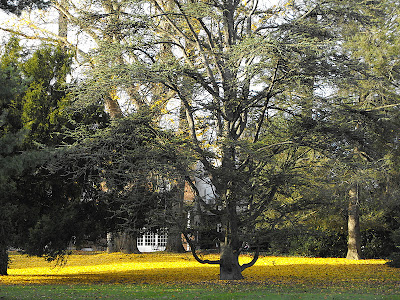Amber is the color that becomes the garden, for November (in these parts, never October) signifies what is both the garden's final retreat, and its inexorable march towards its annual, ritualistic demise.
Amber mutates, morphs, appears in various strains,
from the more translucent golden yellows of Solomon's Seal (Polygonatum commutatum)
and the deeper yellow-golds of the Gingko Biloba tree which has painted the field beneath it bright (a stark contrast to its now darkened skeleton),
to the rich brown-yellows of Orange Marmalade hosta,
from the orange hues of Rose Mallow's palmated leaves,
to the rich brown-ambers of the Big Blue Hosta,
the Blue Angel Hosta (the photo was taken early in its coloric metamorphosis, hence the lighter tones which quickly gave way to the deep amber visible at its tip),
and the Carolina Allspice,
to the the rare (in the gem world at least) red-ambers as seen in this Bald Cypress allee.
Amber is the official notice: the color of automobile turn signals (the industry has, I've learned, named the color of those yellow-brown plastic casings "Automotive Amber"), the alert when a child is missing, the last flash of brilliance before autumnal barren becomes the norm.
 Amber is the color of absolution: a reward for our gardening follies (gardening is a persistent education, after all, a learning from our mistakes).
Amber is the color of absolution: a reward for our gardening follies (gardening is a persistent education, after all, a learning from our mistakes).Amber is the preservative of garden memories, a golden dusk that arrests the moment and the season just as we awake and realize we've lost our grip.
Amber is the apogee of splendor, the final color before moribund, dessicated brown envelops, and winter white purifies.

























